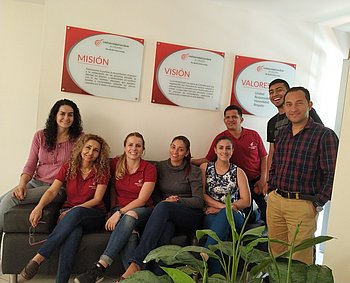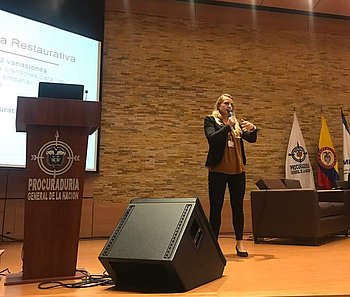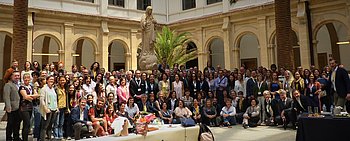Development Service and Global Partnerships
Building bridges between state and society – Colombia
By Simone Dengler
When I was writing my Master’s thesis on the subject of International Peace Education in Prison in 2017, I came across the work of Prison Fellowship Colombia (PFC) and decided to give up my work as a probation officer in Germany for the time being, so that I could go and get to know this charitable organisation at first hand.
I was able to organise a six-month voluntary internship through Seehaus e.V., one of PFC’s partners. At the request of PFC, this then turned into a deployment as a development worker in Medellin for two-and-a-half years with Christliche Fachkräfte International (CFI) (“Christian Professionals Internationl”).

Already during the internship, it became clear how much PFC is committed to social justice for prisoners and their relatives and how much the organisation relies on international cooperation in its day-to-day work. Without its international donors, such as the Hoffnungsträgerstiftung (“The Hopebearer Foundation”), PFC would not be able to do so much. PFC currently has 10 programmes inside and outside the prison system. These are run by approximately 1,500 volunteers and about 100 employees around the country. I soon gained the impression that PFC is doing great work, but gets hardly any support from partner organisations inside the country. The reasons for this can be traced back to Colombian history, though. Often people don’t trust each other in Colombia, because of corruption, the political division of the country, and the many years of civil war. So my motivation for undertaking development service and also one of the goals of the project was to strengthen cooperation between PFC, as an NGO, and the Colombian government.
To start with, during the first year, I learned how important empathy for victims programmes are in the extremely overcrowded prisons. I then had the task of developing the structure of one of these programmes which helps offenders to put themselves in the shoes of their victims. The programme was implemented in 11 prisons around the country. It was essential to maintain good cooperation with the local prison administration and law enforcement officials and with human rights organisations, along with other organisations, and to facilitate dialogue. In this way, we were able to work together towards the goal of social rehabilitation, in spite of numerous bureaucratic hurdles.

In 2019, after I had successfully completed a training course in restorative justice at the Office of the Attorney General in the capital, Bogotá, I was entrusted with the task of setting up a victim-offender mediation pilot project for young people. This was funded by the Swedish Mission Council (SMC) initially and was to be taken over by the Colombian state after three years. From the outset, I felt that it was important to establish a network of national and international stakeholders in order to be able to learn from their experience. As the newly assembled team for the youth programme, we began by organising some round table discussions with decision-makers, including civil servants in the Youth Office and the Office of the Attorney General, judges, lawyers, and university professors in the fields of law, psychology, and social work. It became clear that, although there was great interest on all sides, local resources were lacking for effective cooperation in this area. Thanks to the development service and support from the SMC, we were able to find the necessary resources, which was very much appreciated by the participants, especially the Office of the Attorney General.
Since everyone came from different disciplines, we organised a course which would bring us and other interested parties to the same level of knowledge and then create a forum for discussion. We realised that very few state VICTIM-OFFENDER MEDIATION schemes for young people had been created, even though the legal basis exists. In the PFC team we quickly drew up our own guidelines and concluded an agreement with the local public prosecutor for a pilot project. The first four pilot cases successfully completed the 3-4 month process which we had designed and which entailed the negotiation of an out-of-court settlement. But in order to be assigned further cases, more had to be done to make the process known and we also had to apply for a government-recognised licence. So we were tasked with giving several lectures at in-service training courses for prosecutors and judges, for example, because many of them had barely come across the concept of victim-offender mediation in the past. We were then invited to national and international congresses to present the initial results there as well. We came away with valuable materials from work in the field of VICTIM-OFFENDER MEDIATION in Spain, Argentina, the USA, and other countries.

At about the same time, the Colombian Ministry of Justice published a detailed, science-based manual on the legally established implementation of processes of restorative justice in Colombia. Our contacts enabled us to participate as a team in one of the training courses and we were able to adapt our concept accordingly and to finally apply for state funding for the programme. Unfortunately, we are still waiting for the application to be approved.
For me, global partnership means making connections internationally for the mutual benefit of everyone involved. In this case, I was at an advantage as a neutral person from abroad. This enabled me to quickly make contacts which locals can sometimes only reach with great difficulty. On the other hand, when the pilot phase had been completed, it was also important to hand over the programme management and the cooperation with the state authorities to a local worker as soon as possible, so that local people feel that they “own” the project.
While I was working in development service, I also observed how strongly the sphere of action of the state is divided from that of society, and how difficult cooperation is – and not only in Colombia. In Europe and Germany, too, it sometimes seems to be a great challenge to bring the interests of civil society and the state together. Development cooperation is therefore necessary wherever people want to develop further. In my opinion, development service helps to foster solidarity and to represent and bring together various interests of both state and society. In this way, we are able to build bridges which may enable us to achieve the sustainable development goals set out in Agenda 2030.
I am very grateful to have been able to bring my experience of networking back with me to Germany. Now that I’m back in the role of a probation officer once again, I shall try here as well to create mutual understanding between society and the state, so that we can all learn and move forward together.
